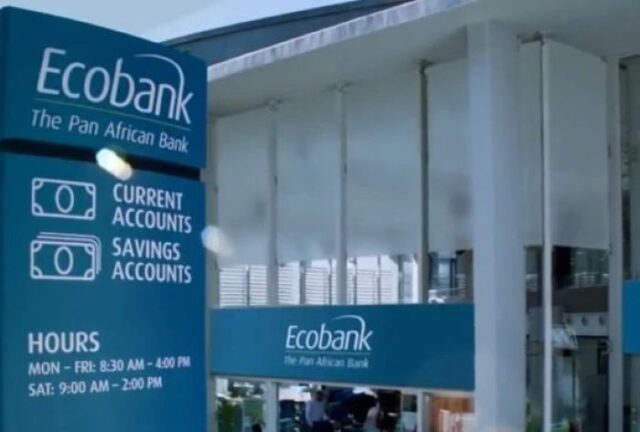…29.5%, Cost-to-income: 53.8%, Loans-to-deposits: 53.7%, and Total CAR: 14.3%
…Stable credit quality with NPL ratio at 7.0% and cost-of-risk at 262 basis points.
…Results reflect the resilience of Ecobank’s diversified business model, efficiency, and stability
WED MAY 22 2024-theGBJournal| ECOBANK Transnational Incorporated released its Unaudited Financial Statements for the period ended 31 March 2024 on Tuesday, reporting profit of $69 million, up 9% from the prior year period, driven by positive operating leverage (revenue growth exceeding growth in operating expenses.
ECOBANK Group profit before tax increased by 20% in the first quarter of 2024, or 69% when adjusted for foreign currency translation effects, to $150 million, primarily due to positive operating leverage.
As a result, pre-provision, pre-tax operating profit (PPOP) increased 11% or 43% at constant currency to $229 million.
Group net revenue (net interest income plus non-interest revenue) for the first quarter of 2024 was $496 million, up 3% or 30% at constant currency from the prior year’s quarter.
Growth continued to benefit from the favourable net impact of higher rates on interest earnings assets and fees generated on payment and trade volumes on modest client activity.
Corporate and Investment Banking’s (CIB) net revenue increased 8% to $257 million, driven by higher rates and cash management. Net revenues at Commercial Banking (CMB) rose 8% to $141 million, benefiting from higher payments and cash management fees. Consumer Banking’s (CSB) net revenue grew by 2% to $127 million, driven by deposit margins and payments.
Net interest income for the first quarter of 2024 was $289 million, increasing by 9% or 36% at constant currency, and the net interest margin (NIM) was 5.6% compared with a net interest income of $266 million and a NIM of 5.0% in the prior year period.
Interest income earned on interest earning assets increased slightly by 1% to $453 million, primarily driven by the favourable net impact of higher interest rates and a modest increase in investment securities balances.
Interest expense on interest-bearing liabilities decreased by 11% to $164 million on improving deposit mix as efforts to drive current and savings accounts (CASA) paid off.
Non-interest revenues decreased 5% or in constant currency, increased 22% to $207 million in the first quarter of 2024. Unadjusted for foreign currency translation impacts, net fees and commission income of $122 million decreased by 2%.
Net trading income of $80 million decreased by 9%, reflecting lower fixed-income, currencies and commodities (FICC) and trade fees and the impact of management’s decision to change Zimbabwe’s functional currency to US dollars because of material dislocations in the country’s CPI index and the exchange rate.
Group operating expenses for the first quarter of 2024 were $267 million, decreased by 4% or, in constant currency, increased by 20%. The underlying expense increase was due to a mix of inflationary-driven costs, staff-related costs, and costs associated with business growth, distribution, and technology.
The cost-to-income ratio, an efficiency measure, improved to 53.8% in the current quarter from 57.3% in the prior year’s quarter. It benefited from positive jaws, a differential of the year-on-year percentage changes in net revenues and operating expenses.
The positive jaw ratio was 6.2% in the first quarter of 2024 compared to 1.5% in the first quarter of 2023.
Group pre-provision, pre-tax profit (net revenue minus total operating expenses), a key metric for assessing the bank’s earnings power, increased 11% or 43% at constant currency to $229 million.
Group income taxes for the first quarter of 2024 were $45 million compared with $37 million in the prior year’s quarter. The associated effective income tax rate (ETR) was 30.1% versus 30.0% a year ago.
Group gross impairment charges on loans and advances for the first quarter of 2024 were $105 million compared with $33 million in the prior year’s quarter. Ghana was the primary driver responsible for the increase in gross impairments, where weak credit market fundamentals prompted a conservative and proactive rise in impairment charges.
Loans recovered, and the release of previously booked impairment reserves for expected credit losses amounted to $35 million compared with $16 million in the prior year, bringing the net impairment charge on loans and advances to $70 million for the first quarter, compared with $18 million in the prior’s year quarter.
As a result, the cost-of-risk increased to 2.62% from 0.62% for the previous year.
Impairment charges on other financial assets (aside from loans and advances) declined significantly by 69% to $9 million in the first quarter, primarily because last year’s quarter included the net modification losses Ghana incurred from the final exchange of its eligible bonds for the new bonds under the Government of Ghana’s (GoG) Domestic Debt Exchange Program (DDEP) in February
2023.
”We made meaningful progress in our Growth, Transformation, and Returns strategy, evidenced by revenue growth across all our businesses. We particularly focused on our Consumer Commercial, and Payments businesses due to their promising growth opportunities,” Jeremy Awori, CEO of Ecobank Group, said while commenting on the Group’s earnings.
He said the results for the quarter were strong and demonstrated the continued benefits of diversification and business growth despite uncertainty around rate cuts, persisting inflation, pressure on African currencies, muted economic output, and geopolitical risks.
According to Jeremy Awori, ECOBANK Transnational is fully committed to improving its customers’ experiences by streamlining operations, upgrading its technology
platforms, and simplifying and automating manual processes.
”We are investing in building and enhancing our customer value propositions as we grow our Consumer and Commercial franchises. These transformational initiatives are the bedrock of our GTR strategy, positioning us to serve our customers and communities well and deliver sustainable longterm returns to our shareholders, regardless of the economic cycle,” Awori added.
“We will continue to focus on banking fundamentals, running our day-to-day operations with discipline and efficiency, and doing what is right for our customers. We are confident in our strategy to deliver for our customers, employees, communities, shareholders, and broader stakeholders and will leave no stone unturned in driving our transformative initiatives,” Awori concluded.
X-@theGBJournal|Facebook-the Government and Business Journal|email:gbj@govbusinessjournal.com|govandbusinessj@gmail.com










